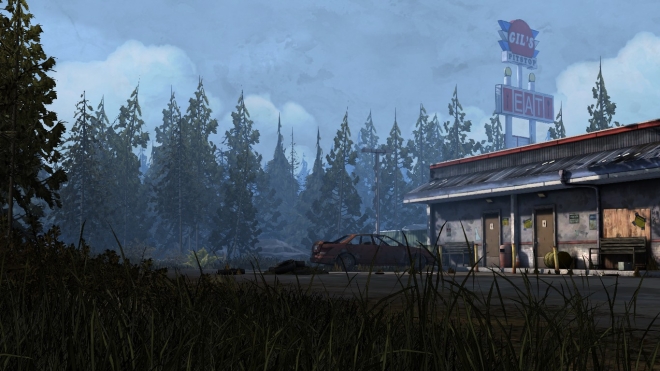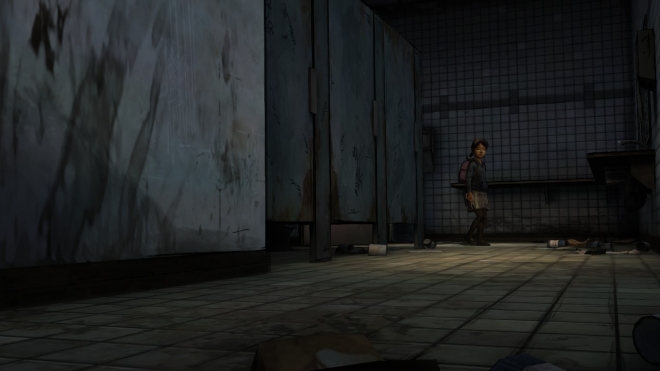Review: The Walking Dead Season Two
Platform: PC, Xbox 360, Xbox One, PS3, PS4, PS Vita, iOS, Android, Ouya, Kindle Fire HDX
Developer: Telltale Games
Website: https://www.telltalegames.com/walkingdead
Australian rating: R18+
The second series of Telltale’s Walking Dead game stars a new protagonist: 10-year-old Clementine. If you thought having a child hero might involve toning things down from the previous season’s tough choices and brutality, the first episode proves you very wrong. It’s not long before survivors are turning on each other and zombies having their heads collapsed, and at one point Clem has to suture a serious wound. I’ve never found it so hard to perform a simple click and drag as I did when pushing that needle.
While the first season took a couple of episodes to find its feet, with some awkward puzzles at the start, season two feels more coherent, mechanically speaking. When violence breaks out it’s dealt with via quick-time events, but unusually well-implemented ones. While much of the praise Telltale receives is for their writing, in The Walking Dead and Wolf Among Us they’ve redeemed one of gaming’s most hated elements, and whether it’s swiping to avoid grabbing hands or tapping to lift rubble from a trapped limb before walkers come, these moments manage to get your heart racing without causing frustration.
But a lot of the time you won’t be head-shotting zombies or running for cover; you’ll be having lengthy conversations with other survivors to earn their trust. Clem may be a kid, but she’s survived a hell of a lot and so her role in the new band of post-apocalyptic holdouts introduced this season is sometimes the voice of experience, and sometimes the voice of conscience. She’s competent enough to know things about the undead adults don’t, while innocent enough that her objections carry weight, and can shame people into reconsidering their actions. If that pop-up message “CLEMENTINE WILL REMEMBER WHAT YOU DID” in the first season made you mend your ways, you’ll get to see other characters react as if they’re experiencing the same thing here.
At times the way the other survivors rely on you does seem silly, though. There are occasions when her size lets her access places the others can’t, but sometimes the others’ willingness to let her do the hard work appears either callous or naive. However, there are also moments when characters treating Clem as an equal result in powerful scenes, especially those involving the closest thing to a villain in these episodes, Carver (voiced by Michael Madsen). The head of a strict walled community that’s essentially a prison, he sees in Clem the potential to become a pure survivalist with a philosophy approaching his own, and their interaction is chilling.
The plot builds on the bonus episode from between seasons, 400 Days, but only slightly. One of the least interesting characters from 400 Days graduates to become a central cast member while the others are given background cameos depending on how they ended up. It’s not hugely satisfying, and gives a sensation that 400 Days was inessential, enjoyable though it was, and the effort required to fully integrate a story many players skipped wasn’t deemed worthwhile.
These five episodes mostly focus on your decisions as Clem and what they mean for her growing maturity. (When you click on a doll or a board game while scavenging she’s disinterested, though tinned food and medical supplies thrill her, an effective moment of show-don’t-tell.) The adult survivors you band together with have different ideas on how best to survive – whether it’s better to be a loner who only travels with others when necessary, or keep the group together no matter what while searching for a safe haven – and how you eventually confront these opposing ideas is the real meat of it.
While the first season built to an incredibly effective ending that was only shaped in part by your decisions, the second season can end in radically different ways. Some characters are doomed no matter what, but others are permanently saved or damned by your choices in a more drastic way than the first season managed (though probably not enough to sate those who want an infinitely branching game). The trade-off is that these endings don’t have the same impact that pre-destined and unavoidable one did, but they are your own. I mean, I still cried at the end, just slightly less this time. It neither starts as rough nor ends as smooth as season one, but it’s still a string of gut punches and heartbreak that will leave you ragged.






